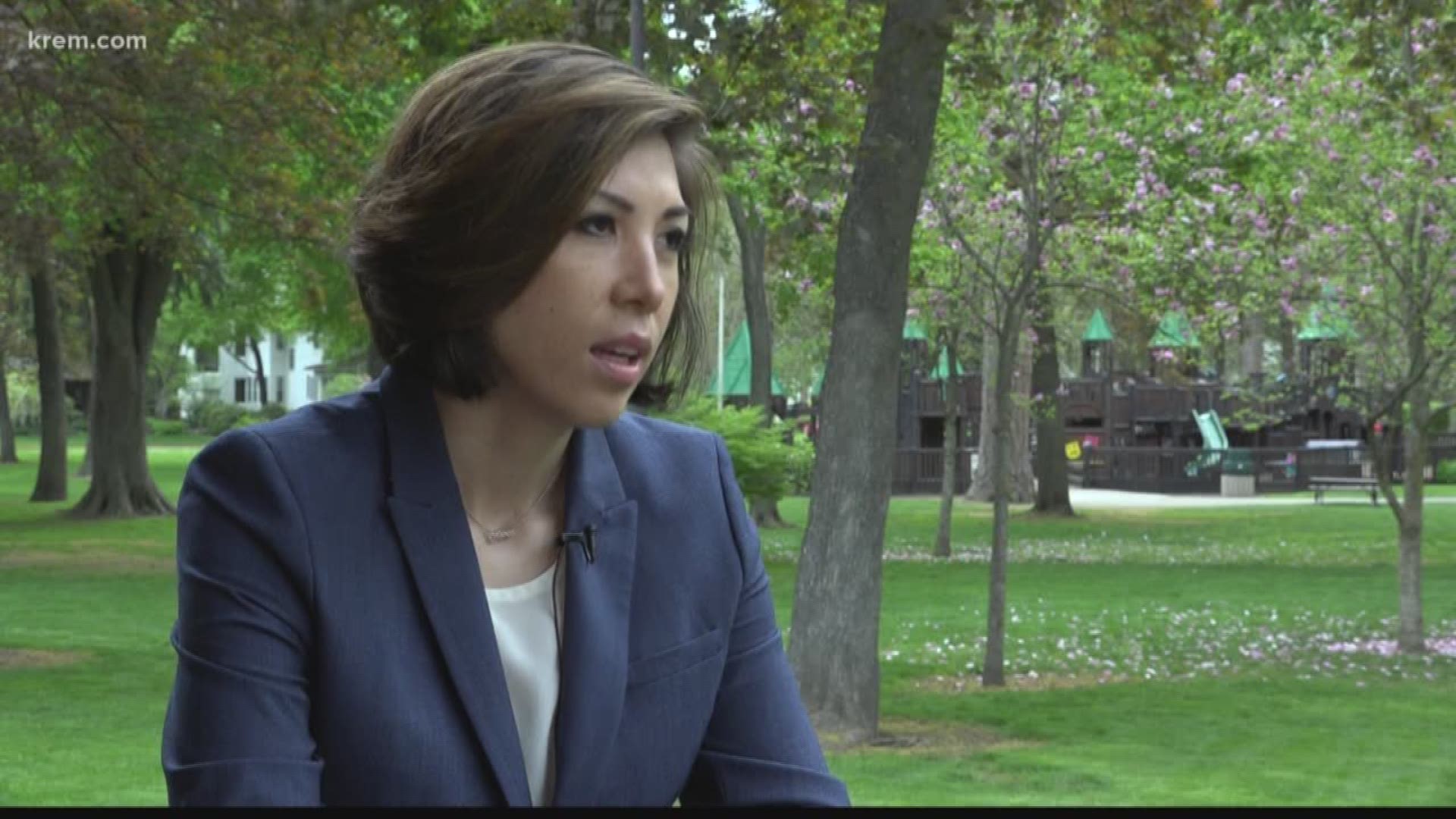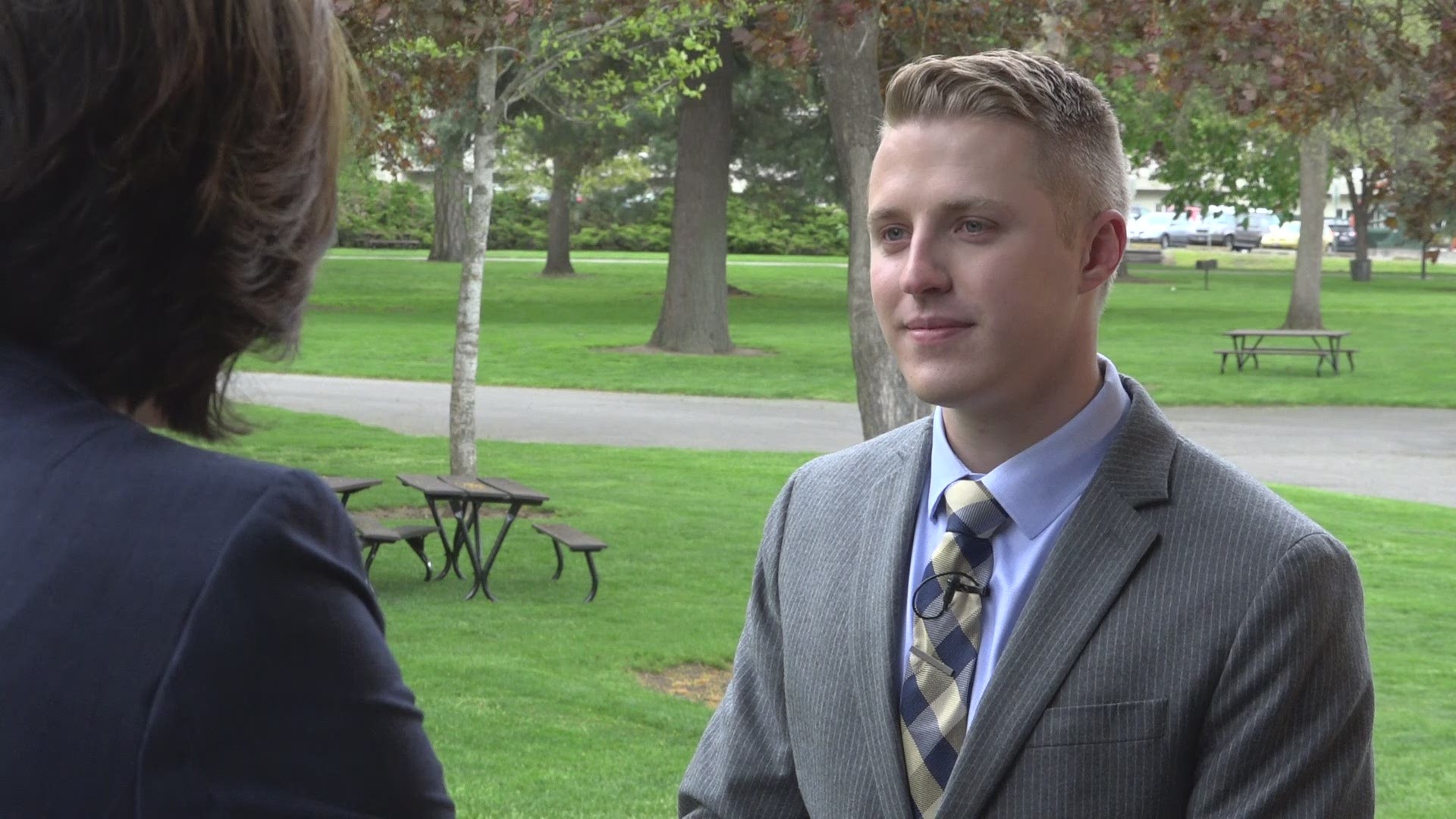Idaho’s race for governor is heating up. KREM 2’s Rob Harris sat down with democratic candidate Paulette Jordan ahead of the Idaho primary.
Q: If you become governor, day one, what’s your first priority?
A: There’s lots of priorities. We have a long way to go from decades of ignoring the people. One, we want to expand Medicaid. We want to make sure we’re prioritizing affordable health care for our constituents in Idaho. We also want to make sure that we’re looking at all the areas of education that we can not only reform but provide innovation, and then fully fund education--of course, putting our teachers at the forefront. And of course there’s so many more issues, and I want people to look at my platform which is on my website, jordanforgovernor.com.
Q: I did look at your platform on your website, and definitely saw that education is a big priority for you, and allocating more funds to education. But, I’m sure you’re the first one to recognize that just allocating more funds doesn’t necessarily improve the quality of education, so what other things do you think need to change within our school system?
A: I would wholly disagree with that statement you just made, because we have defunded education for decades. And it’s unfortunate because we leave out families in Idaho, especially children, when we’re looking at not only innovation but opportunities for them in the school place--whether it’s advanced placement programs, gifted and talented programs, dual credit courses, going on to higher education. We have not included our children in these future conversations especially when it comes to the future of work.
So you--you underestimate the power of teachers. You say that this is not an issue, funding, but yet teachers need to be funded. They need to be paid for. We need to increase their salaries. Of course, we don’t have updated books, we need to make sure that we have updated resources in those classrooms. Schools are dilapidated. They didn’t consolidate in the rural areas of Idaho, then they’re continuing to fight for additional supplemental levees every other year to make ends meet and they’re not covering additional programs. They’re actually skimming down on those programs. Some schools are going back to four days per week. So, if you’re telling me that we don’t need more funding, I would say you’re absolutely wrong.
Q: To be clear, that’s not what I was saying. What I was saying is that funding is just one piece of the puzzle in terms of getting quality education.
A: Right. And that’s one piece of many. But that’s an area of need, which is funding. So I hear that far too often, because there’s this misplaced idea that funding is not going to fix education. But it’s not just that. You need certainly the resources to help cover everybody, from teachers to students and schools. And right now we’re all pushing for supplemental levees, just to make those ends meet which is an additional tax at the local level, rather than paying at the statewide level. So, it’s unfortunate, but as governor this is my intent is to fix that major issue.
Rob: Because Representative Jordan took issue with my question, and seemed to ascribe statements to me that I didn’t actually say, I want to be transparent with *you about my reasoning…
There have been a number of institutes and universities over the years that have studied the connection between school funding and student outcomes….
And this 2016 NPR article actually does a good job of summarizing some of the more notable takeaways.
At the end, the authors come to the conclusion that Representative Jordan does… that funding can make a huge difference in classrooms…
However, they also say that money isn’t, quote, "pixie dust"… and that there are a number of important things to consider when allocating these funds to make sure that it actually leads to improvement for teachers and students.
Q: You brought up health care as well, which is a big issue both on your platform and also just talking to people. It’s a big concern of theirs. You want to expand Medicaid. You also brought up building a public medical school here in Idaho. Big ideas. Where does the money come from?
A: You go bold. Actually, you know if you’ve ever done your research--I don’t think you did--but when you look at the American Medical Association, it says that it has $1 billion impact of every medical school, publicly funded medical school in any state. In Idaho, this is an impact that would be made. In southern Idaho--or wherever we would want to build--but we’re going to work with the three local institutions, whether it’s Boise State, University of Idaho, or Idaho State University, we want to ensure that all of our research institutions are involved in this discussion, that we work together.
And the money is there. I think one of the issues that remains is we have corporate loopholes and incentives that still remain on the table, on top of the fact that we are expanding out of our state. We are investing more in out-of-state prison contracts. The additional $200 million in revenue that came to the state of Idaho was sent away from the people and instead should have been reinvested back here into our communities. So there are contracts that are in place that are even in conflict that should have been managed better and that money still was an impact on the taxpayer’s bottom line. Same with the constitutional-defense fund that our governor currently has which is challenging legislation that is legal based off of personal interests of his. That money could have been saved and gone back into programs that would support the people of Idaho.
Q: So, just to be clear though--you were talking about the eventual economic impact of having a medical school, that statistic is there…
A: No, I just actually told you the reasons what we would save if we were actually just more fiscally conservative and responsible with what taxpayer monies we do have. And this is not about raising any kind of tax whatsoever, because we’re not going to do that. In fact, we’re
going to use the current resources that we already have.
Q: It’s been nearly three decades since Idaho put a democrat in the Governor’s office. Have you heard anything as you’ve been traveling through Idaho to think that this year is going to be different?
A: I definitely hear an uprising in voices, for people are now excited to become a part of their government again. People are having faith in their new leadership. An opportunity. A new voice, basically. You talked being bold before, and that’s the bold new leadership that I offer…
But for myself, I see that folks--whether they’re from southern portions of Idaho or North Idaho, they definitely want to believe again. And they want to fight back for all the right reasons, and I’m really humbled by that because we’re seeing an overwhelming support of our constituent base that I wasn’t expecting. You come off with a message and a vision, and people take notice, and they want to become a part of it. So, this grassroots movement as I’ve said before is I think what really will turn our state for the better.
ROB: Because Representative Jordan again took issue with my question, and suggested I hadn’t researched the topic, I *again want to be transparent about my reasoning.
For the record, Jordan is absolutely right when she said that medical schools can have huge economic impacts.
The Association of American Medical Colleges reported last month that US med schools supported more than 6 million jobs, and added more than 562 billion dollars in value to the national economy last year.
But, Idaho is among the states that requires its legislature to pass a balanced budget each year… which is why I believe my question over the initial funding was a fair question.
FULL INTERVIEW:


